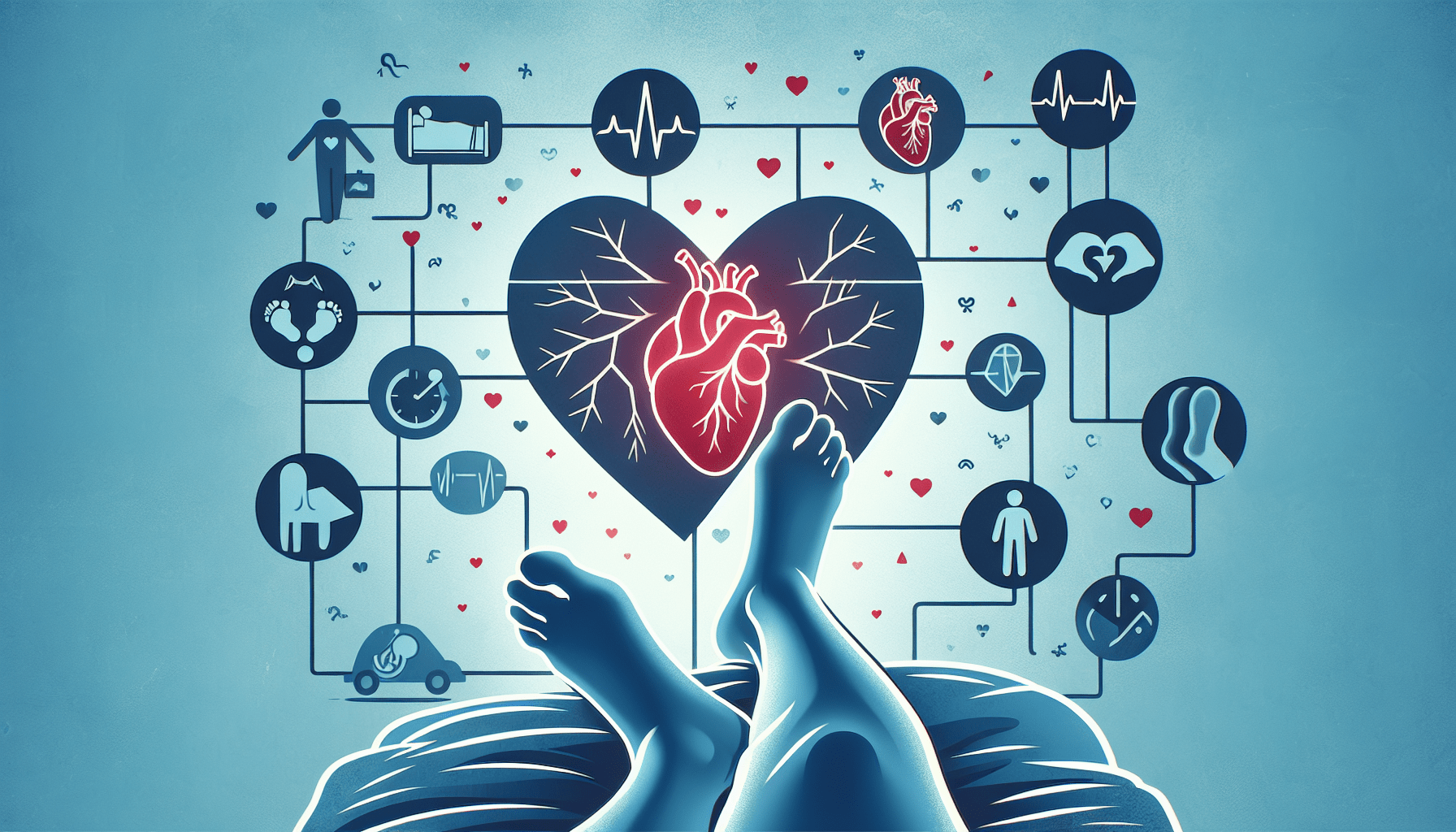Did you know that there is a surprising connection between Restless Legs Syndrome (RLS) and cardiovascular health? It turns out that these two seemingly unrelated conditions are actually intertwined, and understanding their association can provide valuable insights into maintaining a healthy heart. In this article, we will explore this fascinating connection and explore the potential implications for those affected by both RLS and cardiovascular issues. So, if you’re curious to learn more about how your restless legs might be impacting your heart, keep reading!

Overview of Restless Legs Syndrome
Restless Legs Syndrome (RLS) is a neurological disorder characterized by an irresistible urge to move the legs, usually accompanied by uncomfortable sensations. The symptoms tend to worsen during periods of inactivity and can lead to significant disruption of sleep and daily activities. Common sensations include tingling, crawling, or burning in the legs, which can only be relieved by movement. RLS affects approximately 5-15% of the general population, with a higher prevalence among older individuals and those with certain chronic conditions such as iron deficiency, kidney disease, or diabetes.
Understanding Cardiovascular Health
Cardiovascular health refers to the overall well-being and proper functioning of the heart and blood vessels. It encompasses various factors, including blood pressure, cholesterol levels, heart rate, and the condition of blood vessels. Maintaining cardiovascular health is crucial for preventing cardiovascular diseases, such as heart attacks, stroke, and heart failure. Risk factors for cardiovascular diseases include high blood pressure, high cholesterol, obesity, smoking, sedentary lifestyle, and family history of cardiovascular diseases.
Research Studies on Restless Legs Syndrome and Cardiovascular Health
Several research studies have investigated the potential association between RLS and cardiovascular health. These studies aimed to evaluate whether there is a significant link between the two conditions and if RLS could be a potential risk factor for the development of cardiovascular diseases. Overall, the existing research suggests that there is indeed a connection between RLS and cardiovascular health; however, the exact mechanisms underlying this association remain unclear.
Mechanisms Linking Restless Legs Syndrome and Cardiovascular Health
Research has proposed several mechanisms that could explain the link between RLS and cardiovascular health. One possibility is that underlying inflammation and oxidative stress may play a role in both conditions. Chronic inflammation and increased oxidative stress have been observed in individuals with RLS and are known to contribute to the development of cardiovascular diseases. Another mechanism is the potential involvement of iron deficiency and impaired vascular function. Iron deficiency is commonly seen in individuals with RLS and may affect cardiovascular health by altering blood viscosity and impairing the function of blood vessels.

Impact of Restless Legs Syndrome on Cardiovascular Risk
There is accumulating evidence supporting a link between RLS and an increased risk of cardiovascular diseases. Several studies have reported a correlation between RLS and hypertension, with individuals experiencing RLS symptoms having higher blood pressure readings. Furthermore, RLS has also been associated with an increased risk of coronary artery disease, stroke, and heart rhythm disorders. The exact mechanisms and causal relationships between RLS and these conditions are still under investigation, but these findings highlight the importance of identifying and managing RLS in cardiovascular health assessments.
Management and Treatment Strategies
Managing and treating RLS can have a positive impact on cardiovascular health outcomes. Various medical interventions are available to alleviate RLS symptoms, including medications that affect dopamine levels in the brain, iron supplementation, and lifestyle modifications. Treating RLS has been shown to improve sleep quality, reduce daytime sleepiness, and enhance overall well-being. Additionally, lifestyle modifications such as regular exercise, maintaining a healthy weight, and avoiding triggers like caffeine and alcohol can help improve symptoms of both RLS and cardiovascular diseases.
Quality of Life and Psychological Implications
RLS can significantly affect an individual’s quality of life, particularly due to the associated sleep disturbances. It can lead to chronic sleep deprivation, daytime fatigue, impaired cognitive function, and reduced productivity. Furthermore, RLS has been linked to psychological distress, including increased levels of anxiety and depression. These psychological implications highlight the importance of a holistic approach in managing RLS symptoms and improving overall well-being.
Future Directions of Research
Further research is needed to better understand the association between RLS and cardiovascular health. Future studies should focus on exploring the underlying mechanisms connecting the two conditions, as well as investigating the potential for targeted therapies for both RLS and cardiovascular diseases. By expanding our knowledge in these areas, we can potentially develop more effective treatment strategies and preventive measures.
Public Health Implications
Increased awareness and education about RLS are crucial for public health. Many individuals with RLS experience delays in diagnosis and proper management, leading to unnecessary suffering. By raising awareness of the association between RLS and cardiovascular health, healthcare professionals can ensure early detection, timely intervention, and appropriate treatment options. Furthermore, including RLS screening in routine cardiovascular health assessments can help identify individuals at risk and implement proactive measures to prevent or manage potential cardiovascular complications.
Conclusion
In conclusion, there is growing evidence supporting an association between Restless Legs Syndrome and cardiovascular health. While the exact mechanisms linking the two conditions are not yet fully understood, research studies have demonstrated a correlation between RLS and an increased risk of hypertension, coronary artery disease, stroke, and heart rhythm disorders. Managing and treating RLS can have positive effects on cardiovascular health outcomes, highlighting the importance of a multidisciplinary approach. By improving awareness, early diagnosis, and proper management, we can enhance the quality of life for individuals with RLS and reduce the burden of cardiovascular diseases.
